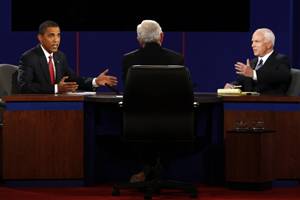McCain, Obama get tough, personal in final debate

Democratic presidential candidate Sen. Barack Obama, D-Ill., and Republican presidential candidate Sen. John McCain, R-Ariz., trade responses during a presidential debate at Hofstra University in Hempstead, N.Y., Wednesday, Oct. 15, 2008. (AP Photo/Ron Edmonds)
October 15, 2008
HEMPSTEAD, N.Y. (AP) — John McCain assailed Barack Obama’s character and his campaign positions on taxes, abortion and more Wednesday night, hoping to turn their final presidential debate into a launching pad for a political comeback. “You didn’t tell the American people the truth,” he said.
Unruffled, and ahead in the polls, Obama parried each charge, and leveled a few of his own.
“One hundred percent, John, of your ads, 100 percent of them have been negative,” Obama shot back in an uncommonly personal debate less than three weeks from Election Day.
“That’s not true,” McCain retorted.
“It is true,” said Obama, seeking the last word.
McCain is currently running all negative ads, according to a study by the University of Wisconsin-Madison. But he has run a number of positive ads during the campaign.
The 90-minute encounter, at a round table at Hofstra University, was their third debate, and marked the beginning of a 20-day sprint to Election Day. Obama leads in the national polls and in surveys in many battleground states, an advantage built in the weeks since the nation stumbled into the greatest economic crisis since the Great Depression.
With few exceptions, the campaign is being waged in states that voted Republican in 2004 — Virginia, Colorado, Iowa — and in many of them, Obama holds a lead in the polls.
McCain played the aggressor from the opening moments of the debate, accusing Obama of waging class warfare by seeking tax increases that would “spread the wealth around.”
The Arizona senator also demanded to know the full extent of Obama’s relationship with William Ayers, a 1960s-era terrorist and the Democrat’s ties with ACORN, a liberal group accused of violating federal law as it seeks to register voters. And he insisted Obama disavow last week’s remarks by Rep. John Lewis, a Democrat, who accused the Republican ticket of playing racial politics along the same lines as segregationists of the past.
Struggling to escape the political drag of an unpopular Republican incumbent, McCain also said, “Sen. Obama, I am not President Bush. … You wanted to run against President Bush, you should have run four years ago.”
Obama returned each volley, and brushed aside McCain’s claim to full political independence.
“If I’ve occasionally mistaken your policies for George Bush’s policies, it’s because on the core economic issues that matter to the American people — on tax policy, on energy policy, on spending priorities — you have been a vigorous supporter of President Bush,” he said.
McCain’s allegation that Obama had not leveled with the public involved the Illinois senator’s decision to forgo public financing for his campaign in favor of raising his own funds. As a result, he has far outraised McCain, although the difference has been somewhat neutralized by an advantage the Republican National Committee holds over the Democratic Party.
“He signed a piece of paper” earlier in the campaign pledging to accept federal financing, McCain said. He added that Obama’s campaign has spent more money than any since Watergate, a reference to President Nixon’s re-election, a campaign that later became synonymous with scandal.
Obama made no immediate response to McCain’s assertion about having signed a pledge to accept federal campaign funds.
















